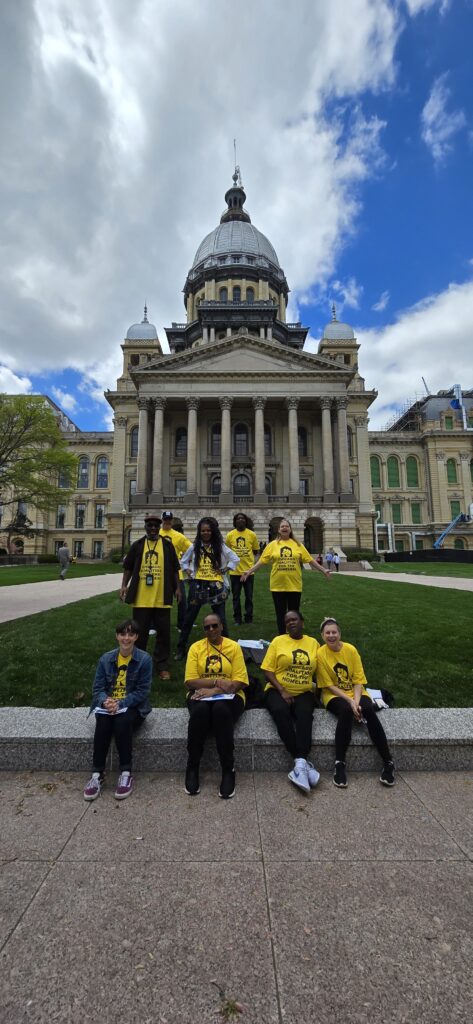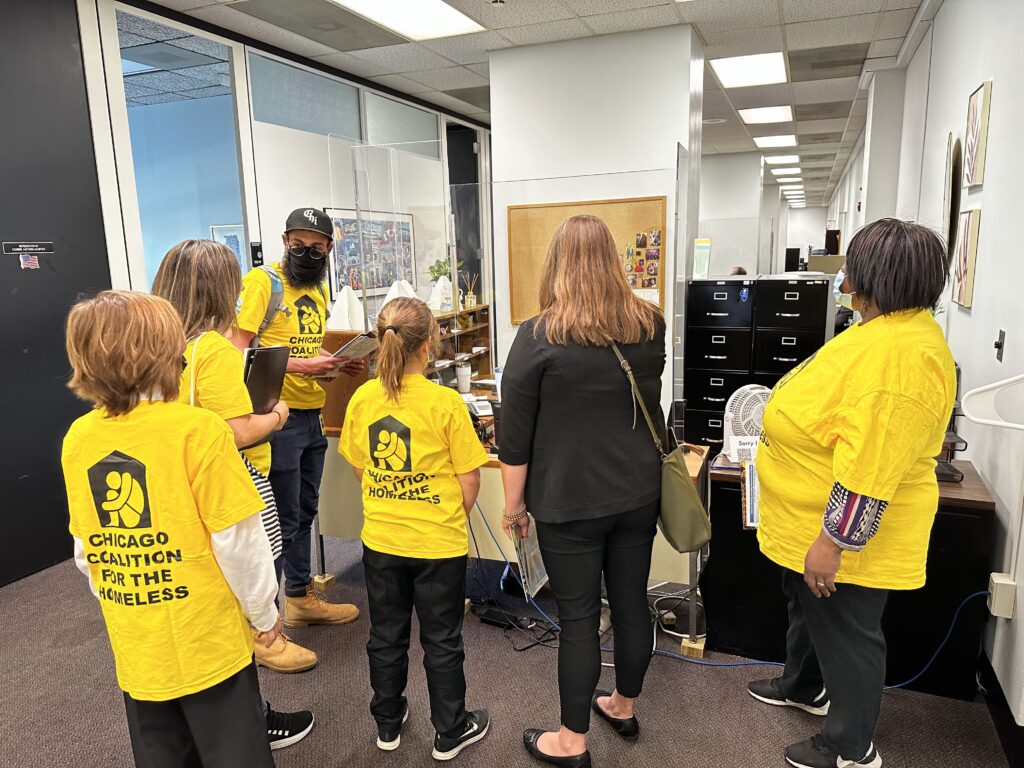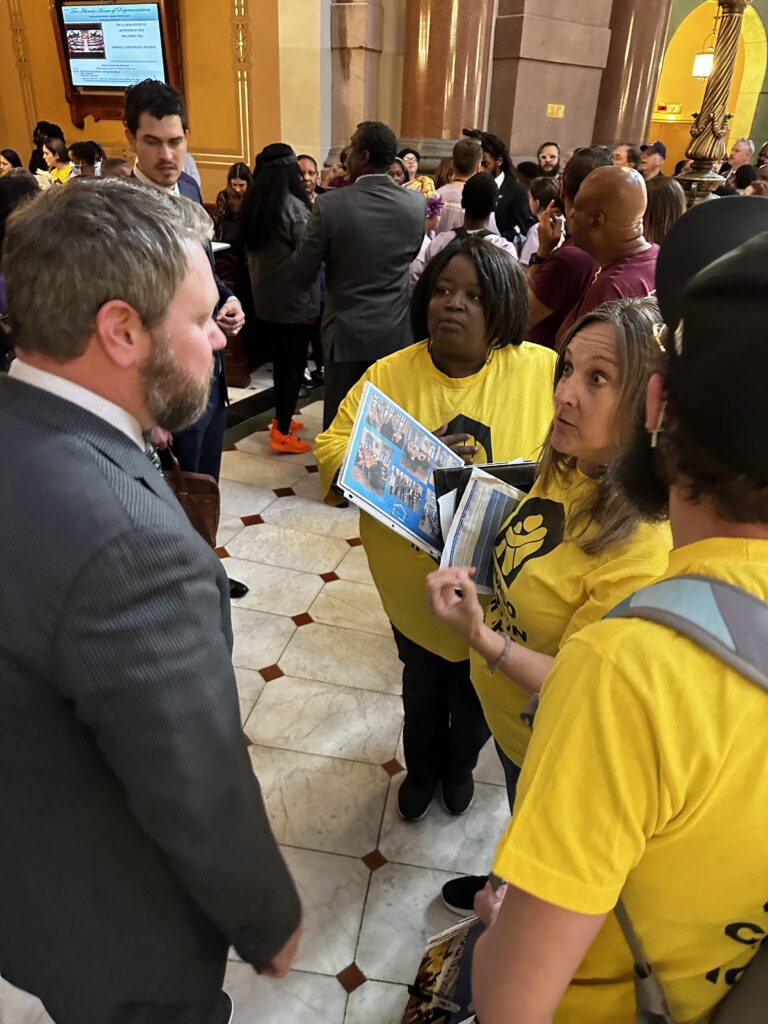“Just because the Supreme Court has overturned this order doesn’t mean cities should just go into a mode of being reactionary and criminalizing people for biological necessities,” she said. “Particularly in Chicago and Illinois, I think there is a recognition that criminalization is not effective. A housing first approach is effective and that seems to be the direction that people here want to move.”
Patricia Nix-Hodes, director of CCH’s The Law Project.
2024 Illinois Legislative Session Wrap Up
This spring Chicago Coalition for the Homeless (CCH) advocated for several statewide measures in Springfield that would help remove barriers for people experiencing and at risk of homelessness. CCH Policy, Law Project, and Organizing staff, along with our grassroots leaders, worked to pass legislation that will impact students experiencing homelessness, families attempting to retain their housing, extremely low-income families, and children, and provide additional funding to homeless and housing service providers.
During this session, CCH hosted several Lobby Days. Organizers brought a number of groups including high school students and teachers, the Homeless Prevention Coalition, grassroots leaders, and youth advocates. They had an opportunity to lobby on both CCH’s substantive legislation alongside budget advocacy.
Legislation Passed and Sent to the Governor for Signature
Strengthening Supports for Homeless Students
HB 5407 (Rep. Michelle Mussman and Sen. Adriane Johnson)
- Illinois has not funded homeless education in over fifteen years. Though the number of students identified as homeless has grown since that time. In recent years, the number of students experiencing homelessness in Illinois increased by 30.86% between the 2020-21 school year and the 2021-22 school year. The federal government has stepped in due to COVID-19 providing homeless education funding, but that support will end in September 2024. In reinstating funds for homeless education, CCH is asking the General Assembly to expand uses for homeless education funds alongside looking at novel ways in which to identify students experiencing homelessness as there are possibly up to 55,000 students experiencing homelessness who were not identified by school districts in Illinois.
Homelessness Prevention Program Improvements
HB 5564 (Rep. Lilian Jimenez and Sen. Laura Fine) included in HB 4959
The Homelessness Prevention Program is a 20-year-old program that has successfully ensured people maintain their housing. 88% of the people who utilize the program remain housed after receiving assistance. It saves the state thousands of dollars per individual in emergency services and shelter funding. Though funding for HPP services has grown, with additional funding additional assistance is needed to support the families and individuals contacting for assistance. With this legislation, providers will be permitted to use up to 20% of their funding for case management to ensure those who are assisted by the program remain housed after receiving assistance.
Ending Housing Retaliatory Behavior
HB 4768 (Rep. Will Guzzardi and Sen. Karina Villa)
Tenants living in buildings without access to heat, water, or other serious conditions sometimes have the added burden of being afraid to contact their landlords or government entities to resolve the issues out of fear of retaliation from their landlords just for reporting the violations. Illinois’ current statute provides only that a landlord cannot retaliate against their tenant by evicting the tenant if they seek governmental intervention for serious issues but provides little recourse to tenants seeking relief or experiencing other forms of retaliation other than eviction. In amending the current statute, we broadened the scope of retaliatory actions and protected activities and provided remedies available to tenants facing retaliation, both monetarily as well as specific performance.
Continued Advocacy Next Session
Community Safety Through Stable Homes Act
SB 3680 (Sen. Karina Villa and Rep. La Shawn Ford)
- Municipalities throughout Illinois have enacted so-called “crime-free housing and nuisance property” ordinances (CFNOs) under the guise of fighting crime and keeping communities safer. However, in practice, CFNOs establish a system that forces housing providers to unfairly penalize and sometimes evict tenants based on any alleged criminal or nuisance activity, pushing families into instability and even homelessness, which undermines public safety.
- CFNOs frequently exclude people of color from housing and endanger our community’s most vulnerable members. This includes survivors of domestic violence and people with disabilities, whose calls for emergency services or the police can lead to eviction rather than the assistance needed. These ordinances often violate fair housing and other civil rights laws.
- Making the Safe Communities and Stable Homes Act law will help make sure people aren’t afraid to contact the police, protect people from unfair discrimination, keep families in their homes, and refocus public policy on more effective responses to crime.
Illinoisians Dedicated to Offering Transitional Solutions
HB 4769 (Rep. Guzzardi)
- In Illinois, as with much of the country, people experiencing homelessness do not always have access to temporary shelter. For those individuals, finding refuge under viaducts and expressways may be the only way to find shelter from the elements. Understanding that these spaces also need repair or other construction projects, making sure that people using the space for shelter are notified and assisted with finding other options is also important. This legislation would require transportation departments to assess whether people experiencing are in the pathway of construction and if so partner with state or local human service departments to identify shelter or other housing opportunities.
Support the Community Partner Fair Contracting Act
HB 5064 (Rep. Avelar) SB 3457 (Sen. Halpin)
The Community Partner Fair Contracting Act (CPFCA) will rectify structural inequities in the state’s contracting, payment, and court of claims systems to ensure that health and human service providers can better meet the needs of their communities.
- Ensure Timely Contracts and Payments: Amends the Prompt Payment Act (PPA) to require agencies to issue contracts within 30 days of the start of the grant term and approve bills or invoices within 30 days. It also shortens the time frame between when the bill is approved and when interest begins accruing from 90 to 45 days.
- Expand and Clarify Advanced Payment Eligibility: Amends the PPA to expand the list of critical services in statute and requires state contracts to identify a payment date and whether a contract is eligible for PPA and advanced payment.
- Promote Flexible Contracts that cover the full cost of services: Amends the Grant Accountability and Transparency Act (GATA) to remove arbitrary caps on fringe benefits and prevents state agencies from limiting indirect costs in contracts or grant agreements to less than 20%.
- Expedite and Simplify Court of Claims Process: Amends the Court of Claims Act (CCA) to divert undisputed lapsed appropriation claims of less than $2500 and allow state agencies to pay claims from any appropriated funding source.
Fiscal Year 2025 Budget Advocacy
Commit to Funding and Ending Homelessness in Illinois
The recently completed state plan required by Governor Pritzker’s executive order, Home Illinois, creates a framework for achieving functional zero homelessness. The shortage of affordable housing is compounded by circumstances such as people losing employment, dealing with chronic physical and/or mental health problems, domestic violence, or a family turning away a child results in homelessness.
State-funded programs to prevent and end homelessness receive deeply inadequate funding to achieve the plan’s goals. Providers have continuously stepped up to serve more people in crisis during the pandemic and continue to struggle with:
- Increasing rents in the private market, making it harder to help people maintain or find a home.
- Agencies unable to pay competitive wages to retain and recruit qualified staff.
- Shelters losing donated spaces and volunteers due to COVID-19 concerns.
This legislation will increase the housing and homeless service line items. These funds will help support the development of new housing opportunities, keep people on the brink of homelessness to maintain their housing, provide supportive services, and make sure that staff in these programs are provided with a living wage.
Supportive Housing Services
- Total Increased Funding Need: $11 million
- The FY25 budget does not provide for additional funding.
Homeless Youth Program
- Total Increased Funding Need: $8 million
- The FY25 budget provides a $1.5 million increase through the reallocation of existing HOME Illinois funding
Homelessness Prevention Program
- Increased Funding Need: $10 million
- The FY25 budget provides a $5.4 million increase through reallocation of existing HOME Illinois funding.
Emergency and Transitional Housing Program
- Increased Funding Need: $20 million
- The FY25 budget does not provide for additional funding.
Homeless Education
- Increased Funding Need: $5 million
- The FY25 budget includes $16 million in ARPA dollars
Revenue Advocacy
In ensuring that the state has the funding to pay for these important services the House and Senate passed a Revenue package that includes increasing taxes on online sports betting, video gaming, hotel re-renters’ tax (on sites like hotel.com or kayak.com), and capping the retailers’ discount, and net operating loss deduction (placing limits on deductions corporations can take on their state taxes). This additional revenue will bring in just under a billion dollars.
Chicago Defender: Legacy of Inequitable Housing Access–How a Black Family’s Story Echoes Today’s Fight
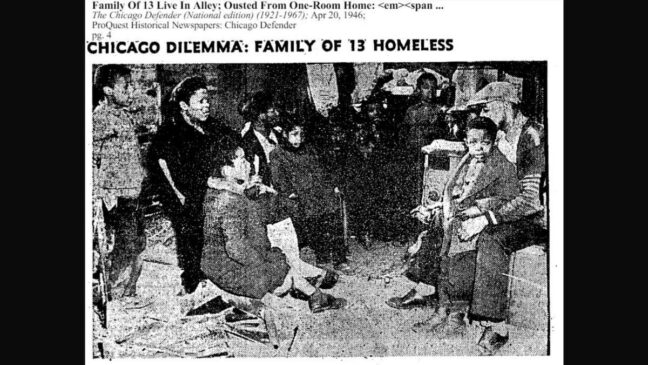
By Tacuma Roeback, Chicago Defender Managing Editor
Thanks to the efforts of Carl Hansberry and later the Dr. Martin Luther King Jr., James Bevel, and Al Raby-led Chicago Freedom Movement, the Fair Housing Act of 1968 was ratified, and restrictive covenants were outlawed. What Chicago’s unhoused population and those on the verge of losing their homes face today is similar to what the Hemmons family endured back in 1946. But politics and entrenched segregation by race and class do the work restrictive covenants once did.
Moreover, organizations that advocate for the homeless and affordable housing argue that Chicago residents recently had an opportunity to vote for a transfer tax known as Bring Chicago Home that would’ve helped to change the fortunes of thousands of unhoused persons and those on the verge of losing their homes.
Instead, the March 19 ballot measure was soundly defeated.
With that setback, a familiar theme prevailed, one that governed the lives of families like the Hemmons and thousands of others, especially those who were Black and poor.
“The powers that be have always pushed back on efforts to make access to housing more just because it undermines their profits and their power,” said Douglas Schenkelberg, executive director of the Chicago Coalition for the Homeless. “And so the loss of the referendum question (Bring Chicago Home) is yet another example of the status quo working to maintain the status quo.”
Bring Chicago Home sought to help two groups: people already unhoused and in need of shelter and those on the verge of losing their homes.
According to proponents, BCH would have incrementally raised the city’s real estate transfer tax on properties valued at more than $1 million. The transfer tax would have generated $100 million yearly for mental health services, job training and educational opportunities for the unhoused. Schenkelberg said BCH monies would have funded two large-scale solutions that would effectively address homelessness in the city.
For Schenkelberg and many who work on behalf of the unhoused in Chicago, the great dilemma is knowing that programs that can effectively address homelessness exist but that there isn’t a sustainable funding stream to address large-scale homelessness in the city.
“Are we investing funding at scale in these proven solutions that we can have a measurable impact on the problem?” Schenkelberg said.
As for the business and real estate interests that opposed BCH, Schenkelberg poses this challenge:
“You’ve said multiple times throughout the campaign and after election day that you think addressing homelessness is a very important issue, that it’s something we have to tackle in the city of Chicago,” he said.
“So how are you going to step up in a way that’s meaningful and has a measurable impact on the 68,000 people experiencing homelessness in Chicago? How will you show up differently than you’ve shown up before Bring Chicago Home?”
This time around, the fight still centers around BCH, which supporters contend is not dead.
They vow not to give up.
They believe they have a measure that could disrupt a persistent narrative and resolve a problem that has impacted Black people the most.
“There were 68,000 people experiencing homelessness before Election Day, and there are 68,000 people experiencing homelessness after it, so one election doesn’t change our course over the long term,” said Schenkelberg.
“The work goes on, and we only honor the people who have fought for this for years by continuing to do the work.”
Oral Arguments Begin in Johnson v. Grants Pass Case, Determining the Constitutionality of Criminalizing Homelessness
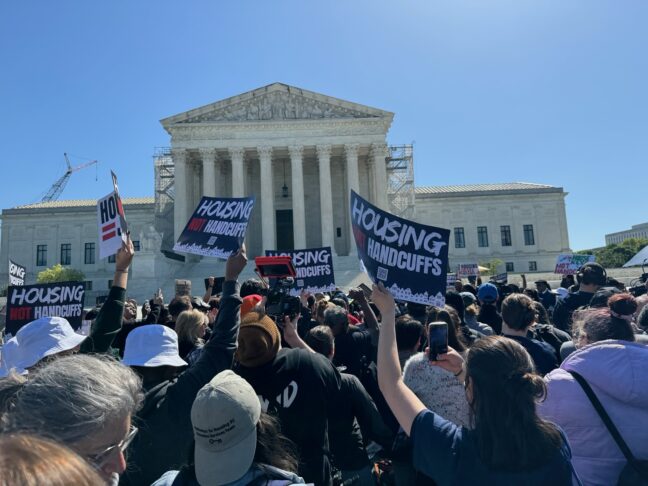
By Sam Paler-Ponce, interim associate director of policy
On Monday, April 22, 2024, the U.S. Supreme Court began oral arguments in Johnson v. Grants Pass, a case deciding if cities have the right to penalize people experiencing homelessness for sleeping outdoors.
Listen to the oral argument by clicking here.
The City of Grants Pass argues the city is just following the trend of most other cities, as many cities across the country are already arresting and fining people experiencing homelessness. However, Grants Pass has taken the most extreme posture: there is nowhere, at no time, where people living outside can sleep with things like a blanket or pillow.
Cruel and Unusual Punishment
At the heart of Johnson v. Grants Pass lies the interpretation of constitutional protections against cruel and unusual punishment. In 1962, the Supreme Court weighed in on a similar issue in the case of Robinson v. California. The case struck down a California law that made it a crime to “be addicted to the use of narcotics.”
The court held that the law may not criminalize someone’s status as a person with a substance use disorder and must instead target some kind of criminal act. Therefore, a state may punish a person for the illegal purchase, sale, or possession of narcotics, and—absent any evidence of illegal drug use— the state of California could not punish someone simply for existing with a substance use disorder.
Martin v. Boise
The 2018 case of Martin v. Boise challenged the city of Boise’s enforcement of camping and disorderly conduct ordinances against persons experiencing homelessness—those who need to sleep in public in the absence of adequate housing or shelter.
Now six years ago, the U.S. Supreme Court denied a petition by the city of Boise to review the case Martin v. Boise (formerly Bell v. Boise). This leaves in place earlier rulings under the U.S. Court of Appeals for the Ninth Circuit, which held that people experiencing street homelessness could no longer be arrested simply because they are homeless.
Dozens of court cases have since cited Martin v. Boise, including courts in Florida, Missouri, New York, Ohio, Texas, and Virginia.
Criminalizing Homelessness
As the U.S. Supreme Court prepares to deliberate on this landmark case, the outcome holds significant implications for the quarter of a million people nationwide who find themselves without shelter on any given night. While the case of Johnson v. Grants Pass serves as a focal point for legal debate, it also highlights the systemic failures that perpetuate homelessness nationwide.
In Grants Pass, people are issued $295 tickets for using a blanket to stay warm when they have nowhere else to go. Punitive measures like incarceration and fines exacerbate the issue, rather than resolve it. The real solution lies in ensuring safe, decent, and affordable housing.
Local Insight
Over 1,000 organizations and public leaders across the country have filed more than 40 amicus briefs (“amici”) in support of Gloria Johnson and homeless rights in the landmark case.
An amicus brief is submitted by a person or group not directly involved in a legal case but is permitted to support the court by providing information, expertise, or insight relevant to the case. These briefs, known as “amici,” aim to inform the court about potential public policy consequences of a ruling.
Chicago Coalition for the Homeless, alongside 27 partner organizations, filed an amicus brief, raising the importance of the case and the impact on people experiencing homelessness in Chicago and Illinois.
The U.S. Supreme Court is expected to take a position by June 2024.
View the transcript of the argument by clicking here.
Chicago Tribune: Chicago to have one unified shelter structure for homeless and migrants, city and state officials say
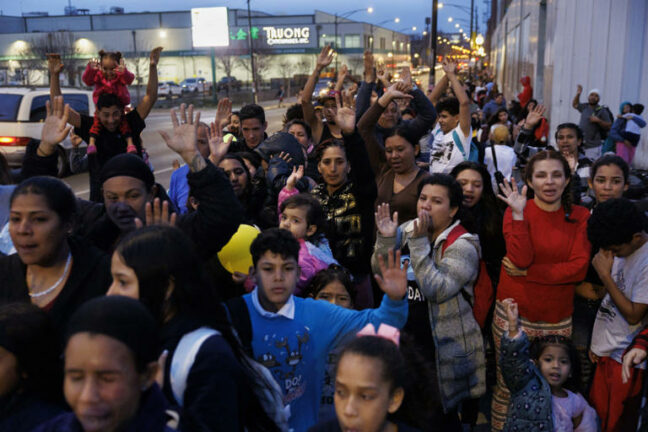
By Nell Salzman, April 22
The city and state are in the planning stages to combine Chicago’s legacy homeless shelter system with its system for migrants, according to government officials, and turn it into a unified shelter structure, an idea advocates for the homeless have long championed.
Sam Paler-Ponce, interim associate director of policy for the Chicago Coalition for the Homeless, said combining the systems is a “move in the right direction.” The biggest benefit, he said, is that asylum-seekers will have a wider array of supportive services made available to them: employment, food and health care.
But combining the systems could also lead to an “influx in shelter bed demand,” he said.
According to recent data from the organization, there are more than 68,000 people currently experiencing homelessness in Chicago. Nearly 37,000 people accessed homeless services throughout the year. These figures don’t include migrants.
WBEZ: A U.S. Supreme Court case could affect homeless people in Chicago and Illinois
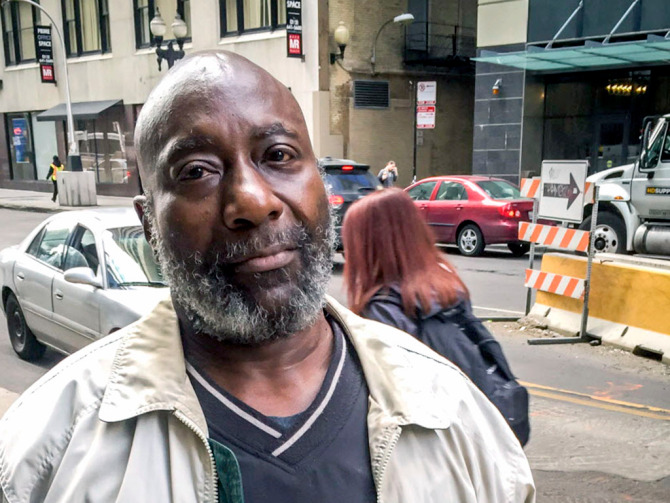
By Esther Yoon-Ji Kang, April 11, 2024
In 2015, Robert Henderson returned from panhandling to the viaduct under which he was sleeping on Chicago’s West Side. He was unhoused at the time.
“When I came back, I saw a blue garbage truck,” recalled Henderson, now 70. “When I finally looked around, everything that I owned at that particular time was thrown in the garbage truck.”
His belongings included blood pressure medicine, his Social Security and Medicaid cards, a copy of his birth certificate, family photos and clippings of loved ones’ obituaries.
With help from the Chicago Coalition for the Homeless, Henderson sued and settled a case against the city of Chicago on the grounds that tossing his belongings violated Illinois’ Homeless Bill of Rights, enacted in 2013.
Now, Henderson, who has lived in a Chicago Housing Authority apartment for the past seven years, is using his experience to speak out against a high-profile case on the U.S. Supreme Court docket.
Chicago Coalition for the Homeless and partners weigh in on high-profile U.S. Supreme Court case, Johnson v. Grants Pass
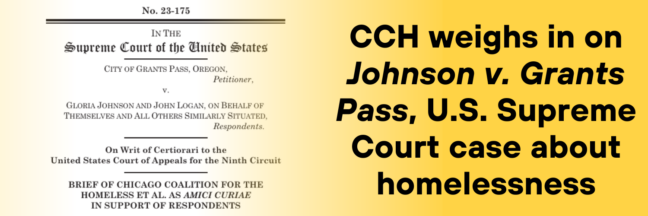
By Sam Paler-Ponce, interim associate director of policy
Chicago Coalition for the Homeless assembled 27 statewide partner organizations in filing an amicus brief in the upcoming case of Johnson v. Grants Pass. On the docket to be heard for oral arguments on April 22, 2024, this will be the first time in decades that the U.S. Supreme Court is hearing a case related to homelessness.
“Homelessness is not something you can sweep under the rug. It needs to be solved in a positive way,” said Robert Henderson, a grassroots leader with Chicago Coalition for the Homeless. “Punishing a person for being homeless is cruel and unusual, and it is not right.” Henderson was living on the street when he first worked with Chicago Coalition for the Homeless as a legal client. In 2018, he became the first person to successfully bring a case under the Illinois Homeless Bill of Rights.
Originating from Grants Pass, Oregon, the Supreme Court will determine if cities have the right to penalize people for sleeping outdoors if they have even a blanket to stay warm, particularly when they have nowhere else to go. At the heart of the matter lies the interpretation of constitutional protections against cruel and unusual punishment.
“The best solutions to the homelessness crisis in this country are creating sufficient affordable housing and providing supporting social services to help individuals stay housed,” said Camilla Krauss, a drafting attorney on the brief. “Criminalizing a person experiencing homelessness for simply existing in the elements not only creates bad precedent but also serves to exacerbate, rather than solve, the core issues.”
“Homelessness is a public health and affordable housing crisis, requiring urgent, meaningful and collaborative action across many sectors. Fines and jailing are traumatizing to people experiencing homelessness and disrupt work towards real solutions,” said Lisa Parsons, Legal Director at Legal Council for Health Justice and a drafting attorney on the brief.
The case challenges the practice of cities like Grants Pass, which resorted to penalizing people sleeping in public spaces with bedding, such as a blanket, despite the absence of shelter in the community.
Chicago Coalition for the Homeless (CCH), alongside 27 partner organizations, filed an amicus brief (relating to amicus curiae, meaning “friend of the court”), raising the importance of the case and the impact on people experiencing homelessness in Chicago and Illinois. Pro bono partner Much Shelist supported CCH in filing the brief, and attorneys Steven Blonder, Josh Leavitt, and Charlotte Franklin were instrumental in drafting the brief.
“The measure of a society is how it treats its most vulnerable. It demonstrates the character and compassion of the citizenry, and our country has made significant advances in the care and sheltering of those experiencing homelessness,” said Steve Blonder, principal at Much Shelist. “A reversal of the Ninth Circuit’s decision would be a major step backward – to a society less caring and more medieval.”
“With homelessness and evictions most seriously impacting Black Americans, criminalizing homelessness is an additional way to make living while Black illegal and must be stopped if we are ever to attain a just society,” said Michelle Gilbert, Legal and Policy Director at the Law Center for Better Housing, a drafting organization on the brief.
“A negative outcome in this case would exacerbate the challenges faced by people living with HIV and other chronic conditions who are also experiencing homelessness, creating additional barriers to accessing the support and services they need to transition out of homelessness and manage their chronic health conditions,” said Nadeen Israel, Senior Vice President of Policy and Advocacy at AIDS Foundation Chicago.
While the case of Johnson v. Grants Pass serves as a focal point for legal debate, it also highlights the systemic failures that perpetuate homelessness nationwide. Punitive measures like incarceration and fines exacerbate the issue, rather than resolving it. The real solution lies in ensuring safe, decent, and affordable housing.
“This case could affect the thousands of Illinois survivors seeking shelter and create further barriers to accessing safe housing,” said Jaclyn Zarack-Koriath, Director of Housing Advocacy at The Network: Advocating Against Domestic Violence.
As the Supreme Court prepares to deliberate on this landmark case, the outcome holds significant implications for the quarter of a million people nationwide who find themselves without shelter on any given night.
“An adverse outcome in this case could make the families we serve even more vulnerable and unstable,” said Karen Freeman-Wilson, Chief Executive Officer at Chicago Urban League, an advocacy organization that works to achieve equity for Black families and communities through social and economic empowerment.
CCH joins the National Homelessness Law Center and hundreds of other organizations that have submitted 39 amicus briefs in support of people experiencing homelessness.
Amicus brief partners: AIDS Foundation Chicago, All Chicago Making Homelessness History, BEDS Plus, Inc., Chicago Coalition for the Homeless, Chicago Rehab Network, Chicago Urban League, Chicago Women Take Action, Covenant House Illinois, Deborah’s Place, Farmworker and Landscaper Advocacy Project, Healthcare Alternative Systems, Inc, Heartland Alliance Health, Housing Action Illinois, Illinois Public Health Institute, Impact for Equity, James B. Moran Center for Youth Advocacy, Law Center for Better Housing, Legal Council for Health Justice, LYTE Collective, North Suburban Legal Aid Clinic, Organized Communities Against Deportations, Red Line Service Institute, Safer Foundation, South Suburban PADS, Street Samaritans, The Network: Advocating Against Domestic Violence, The Night Ministry, and Thresholds.
CCH’s Post-Election Statement as a Member of Bring Chicago Home
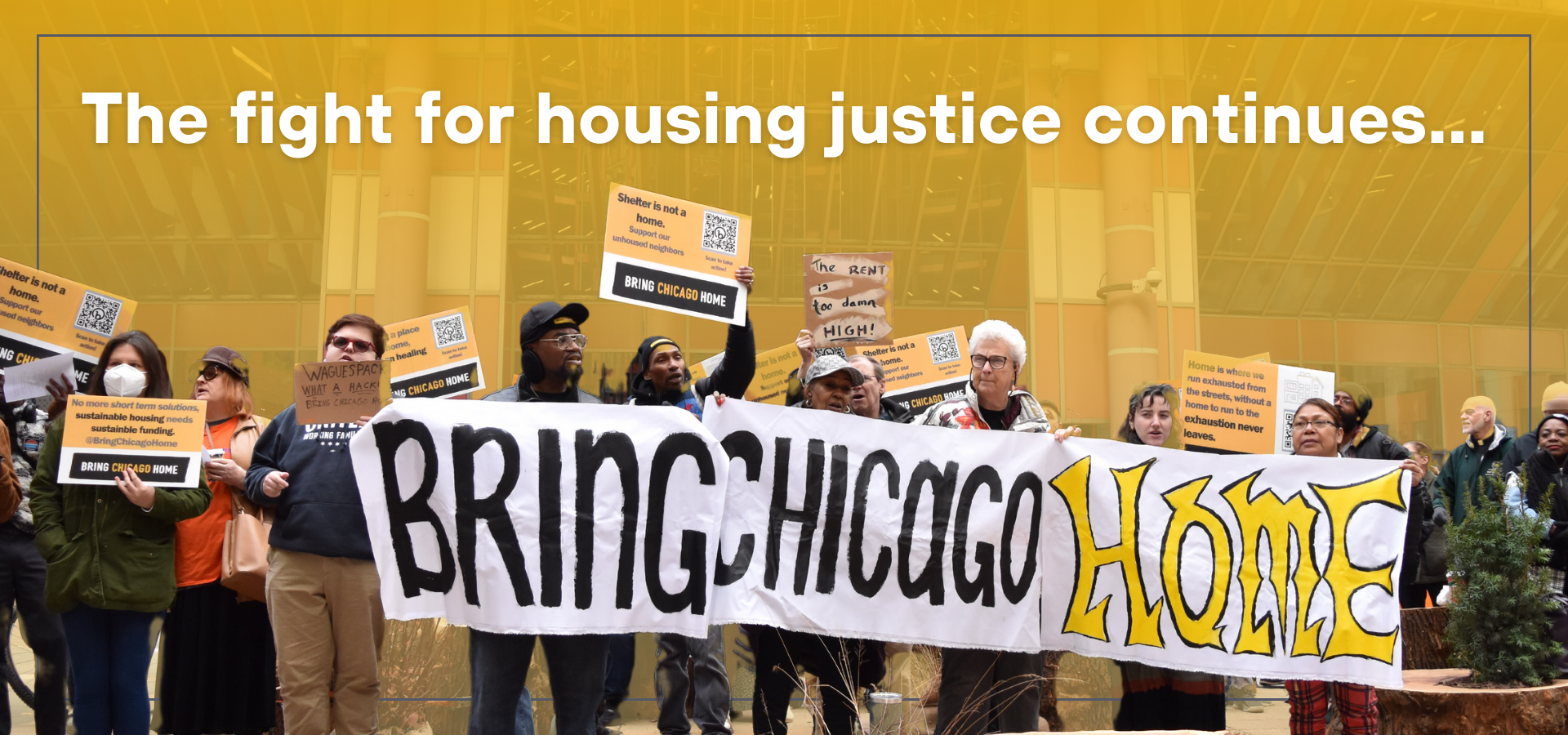
Sharing and building power is how we address homelessness in Chicago.
In 2017, a group of CCH’s grassroots leaders with lived experience of homelessness first developed the idea of what became Bring Chicago Home. Since that first day, we have collectively fought for the revenue we need to provide the permanent housing and services the people experiencing homelessness in Chicago need.
We spent years building a broad coalition made up of people with lived experience of homelessness, union members, faith leaders, social service providers, community organizations, and grassroots volunteers. The opposition tried to intimidate, misinform, and outspend us, but we always had the will and the power of the people on our side.
The March 19th election results did not end the fight. Instead, they amplify our commitment to finding solutions for housing insecurity and addressing homelessness.
Despite this obvious setback, we continue to stay focused on what matters most: the building of a long-term movement for housing justice, with, for, and by the 68,000 Chicagoans experiencing homelessness in one of the richest cities in the world. We invite all who share this vision to join us for the next chapter. The fight for housing justice continues because housing is a human right.
Tribune: Bring Chicago Home–What voters need to know about the referendum
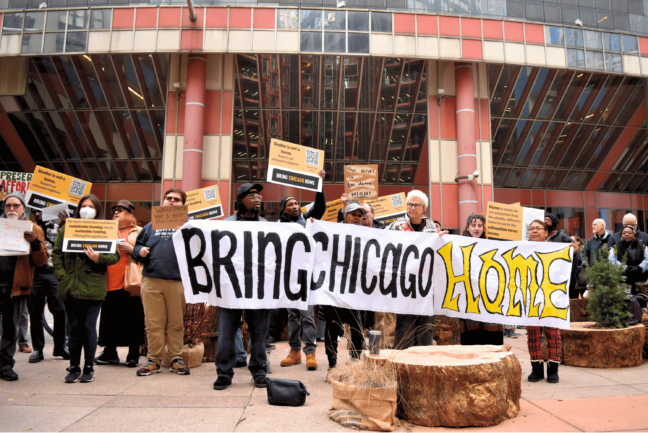
Since 2018, a coalition of homeless advocacy organizations, labor unions and progressive politicians has been pushing the city to designate a special revenue stream for Chicago’s homeless population. Christening themselves as the Bring Chicago Home campaign, they argue the city must address its dearth of affordable housing by raising the one-time tax on property sales.
On Tuesday evening, polls will close in the March primary election in which Chicago voters will decide the fate of a yearslong grassroots campaign to raise taxes for a fund to address homelessness, also known as Bring Chicago Home. Some Chicagoans have already cast their ballots early.
CCH is a proud member of the Bring Chicago Home coalition.
Want to help win Bring Chicago Home on March 19? Here’s how to vote if you are experiencing homelessness

The Importance of Voting
This upcoming election holds a special significance for Chicago Coalition for the Homeless. In addition to voting on key races at local and national levels, at the end of the ballot, you will find a referendum question – known as Bring Chicago Home or Ballot Question One – which would give the city the authority to restructure the city’s real estate transfer tax (the one-time tax paid when a property is bought) so that anyone buying a property for under $1 million would pay a lesser rate, and anyone buying a property for over $1 million would pay a marginally higher rate. All the new funds from the real estate transfer tax would be legally dedicated toward affordable housing and supportive services to prevent homelessness.
This moment has been years in the making. After years of organizing to create a dedicated stream of funding to address homelessness by amending the real estate transfer tax, the Bring Chicago Home coalition – convened by Chicago Coalition for the Homeless – successfully lobbied City Council to put a referendum question to authorize the restructuring of the real estate transfer tax on the ballot. The ballot question is a necessary legal step to pass an ordinance in City Council to implement Bring Chicago Home’s proposal.
Despite an initial court ruling suppressing the vote on the ballot, on March 6th that decision was overturned. This means that on March 19th – you will have the opportunity to vote on a proposal that would dramatically shift how Chicago addresses its housing and homelessness crisis. You have an opportunity to help Bring Chicago Home by voting YES on Ballot Question One.
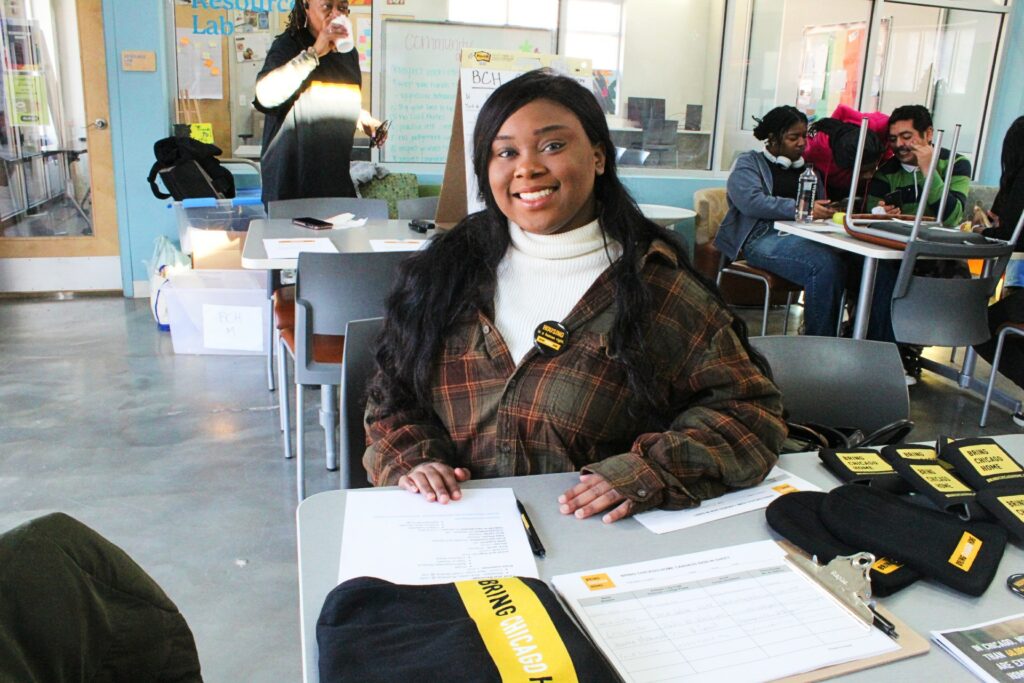
Voting While Experiencing Homelessness
All people experiencing homelessness – whether they are street-based, living in shelters, or doubled-up in the homes of others – have the right to vote. This right is protected by state and federal laws, including the 2013 Illinois Bill of Rights for the Homeless Act.
You can check online to see if you are registered here.
You can register to vote at an Early Voting Site OR on Election Day!
Any Illinois resident ages 18 or older can register to vote on Election Day at the precinct polling place assigned to their residential mailing address. Chicago residents can also register at the Loop Super Site located downtown.
You are required to bring two (2) forms of identification (ID) when registering to vote on-site, including one that shows proof of residence or a mailing address. Acceptable forms of ID include mail postmarked to the applicant; an Illinois driver’s license or state ID card; a municipal ID card (for example, the Chicago CityKey); an employee or student ID; Social Security card; birth certificate; credit card; valid U.S. passport; and lease or rental contract.
Illinois residents who are homeless have the right to vote in all local, state, and national elections, including the upcoming Primary Election on March 19th. Polls are open from 6 a.m. to 7 p.m. Illinois permits residents to vote early and request to vote by mail without providing an excuse or reason for this request. Also, Illinois residents can vote on Election Day even if they are not yet registered to vote.
As one form of ID, a person experiencing homelessness can provide a letter from a drop-in center, shelter, or the person in whose home they are living doubled-up. The letter must confirm that the named person has permission to use the address to register to vote.
To register to vote, you must be a U.S. citizen, at least 18 years old on or before Election Day, and not claim the right to vote elsewhere.
You cannot vote if you are currently incarcerated for a conviction. But, if you are in pre-trial detention and have not been convicted, you remain eligible to vote. Learn more about how to vote in pre-trial detention.
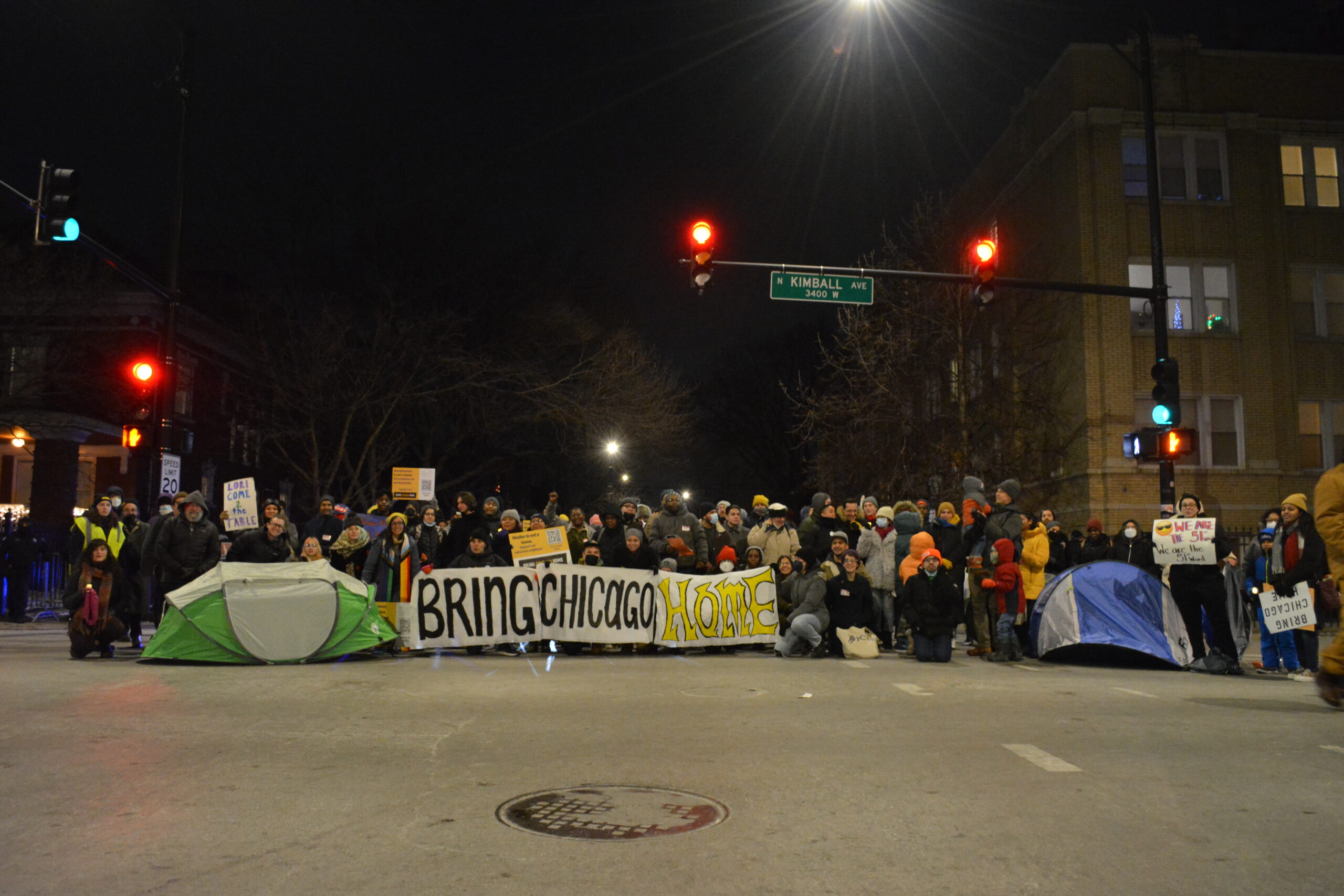
When is ID needed and not needed to vote?
Identification is not necessary if the person experiencing homelessness has already registered to vote at the polling place; the signature they provide matches the one on file; and an election judge does not challenge the person’s right to vote.
But identification is necessary in these situations:
- They registered by mail and did not include the Illinois ID/driver’s license number or Social Security number.
- An election judge challenges the person’s right to vote. Please note: A common reason for challenging a person’s right to vote occurs after the Board of Elections has sent mail to verify a voter’s mailing address, but the mail was returned.
- The individual is registering to vote on-site (see above)
If a voter needs to show ID but is unable to do so, they may cast a provisional ballot. For that provisional ballot to be counted, the voter must present ID within seven (7) days of the election to the Board of Elections.
Voting after a recent move, whether homeless or housed
If you moved within the same precinct within 27 days of the election, you can vote a full ballot by signing an affidavit.
If you moved outside of your precinct more than 30 days before the election and did not register in your new precinct, you may grace-period update your registration through Election Day, and then grace-period vote.
If you moved outside of your precinct less than 30 days before the election, but still live in Illinois and did not transfer your registration, you may grace-period update your registration to your new address through Election Day and grace-period vote. Or, you can vote a full ballot in your old polling place after completing an affidavit.
For Election Day assistance, call these legal help desks:
- Chicago Board of Elections, (312) 269-7870
- Cook County Clerk Karen A. Yarbrough office, (312) 603-0236
- Illinois State Board of Elections has phone numbers in Chicago at (312) 814-6440, and in Springfield at (217) 782-4141. Operators will be standing by until 11 p.m. in Chicago and until 12 midnight in Springfield.
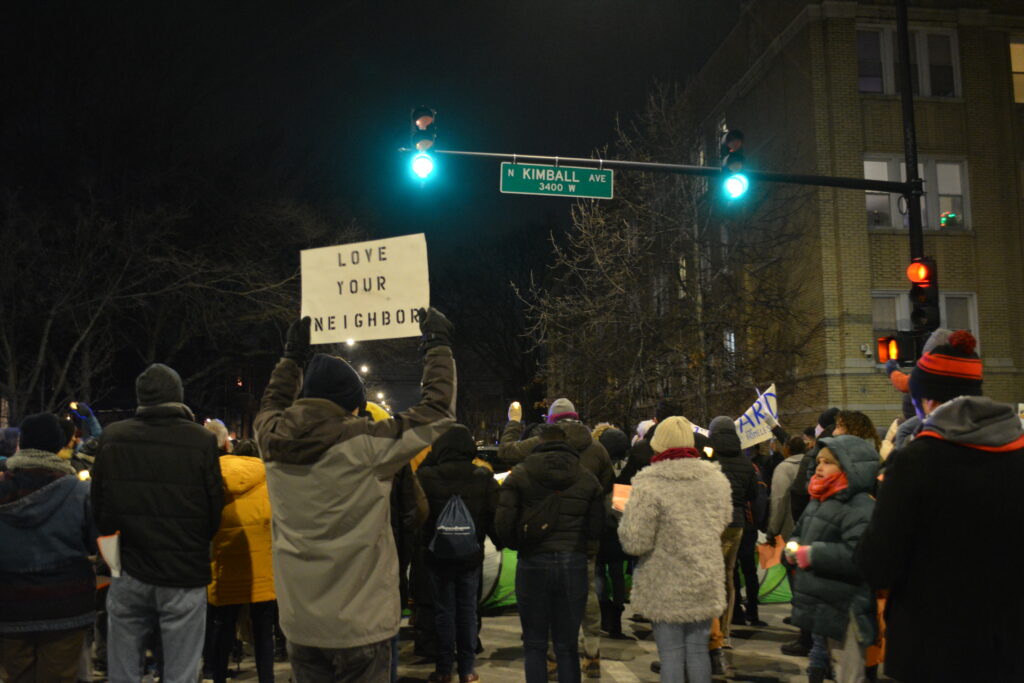
By Niya K. Kelly, Director of State Legislative Policy, Equity and Transformation

